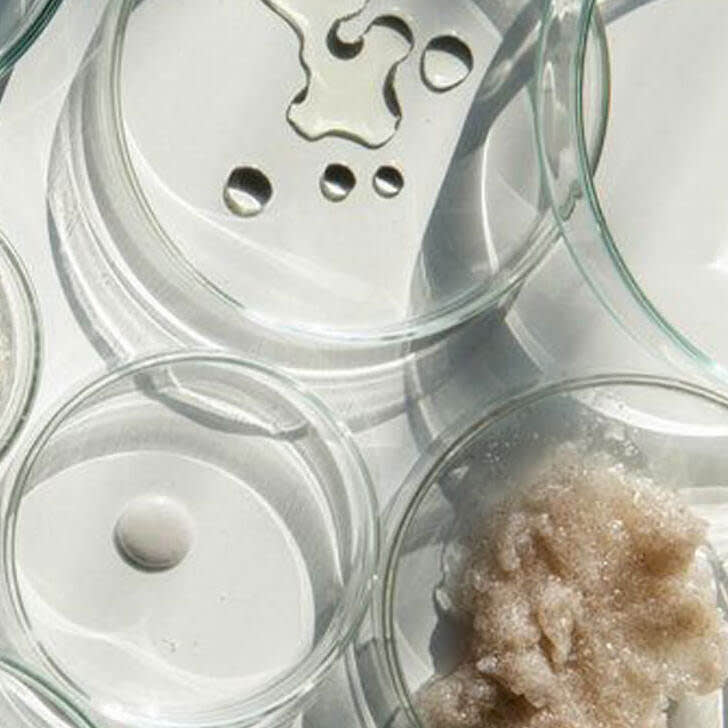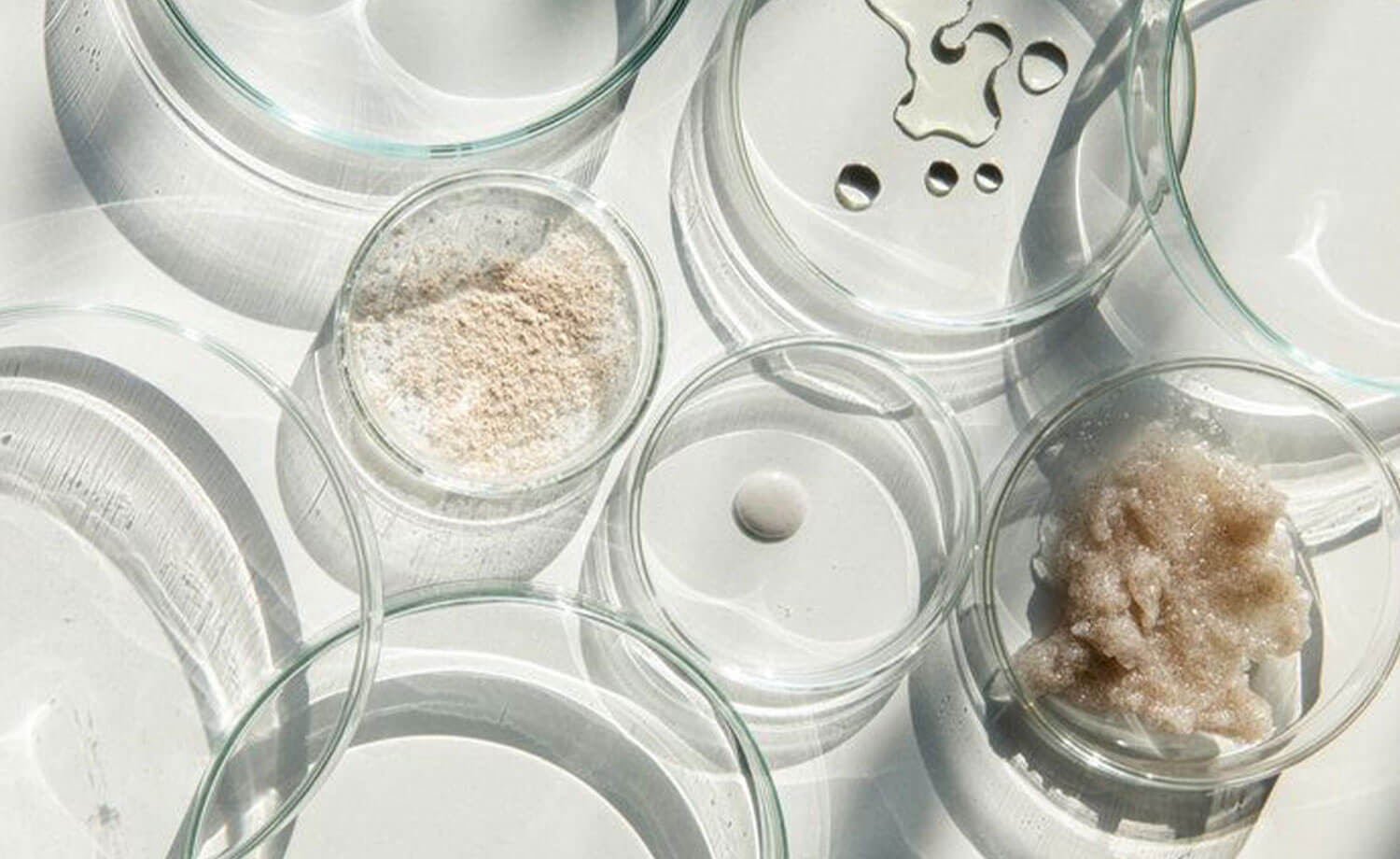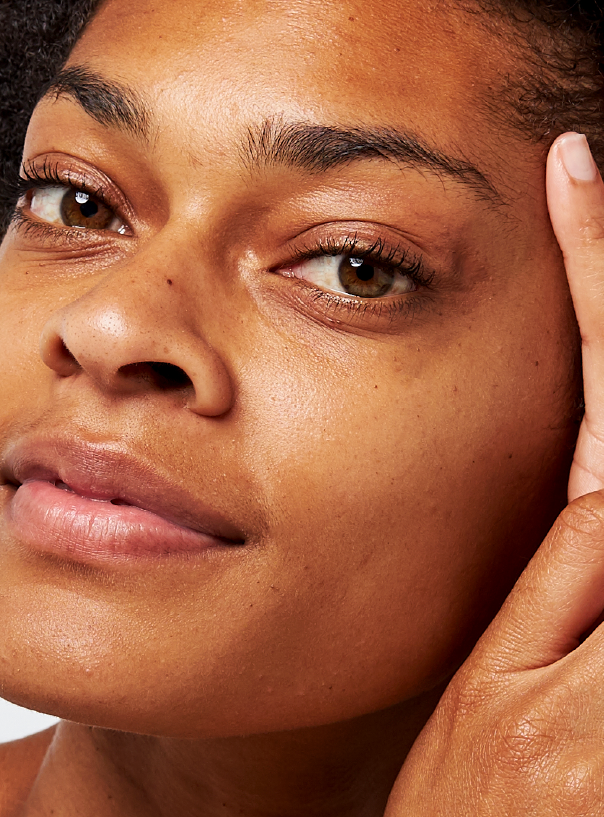Education
Is Hyaluronic Acid Good for Oily Skin?


SHARE
Education
Is Hyaluronic Acid Good for Oily Skin?
Medically reviewed by Katelyn Hagerty FNP
Written by Apostrophe Team
Last updated 4/5/2024
Whether you’ve been dealing with acne, signs of aging, or other skin issues like dark spots or patchy dryness, you’ve probably heard of hyaluronic acid. It is one of the most popular and beloved ingredients for hydrating skin.
But what if your skin is of the oily variety?
Here’s some news: Even if your skin is oily, you need moisture to maintain skin health. If parched skin becomes the norm, it can lead to short-term problems like acne breakouts, and long-term issues like wrinkles.
And sometimes, when it comes to skin health, removing oil may also sap hydration and create excessive dryness. You don’t want that.
So how does hyaluronic acid work for oily skin? Let’s dig in.
Oil and Your Skin
Oil, sebum, lipids: They are all names for a misunderstood part of everyday skin health. As mentioned above, oil is an important element in the upkeep of healthy skin.
Your pores produce oil (also known as sebum) through the sebaceous gland. The sebaceous gland’s purpose is the production of oil, which helps in the process of wicking away dead skin cells from your pores.
And when everything works correctly, that oil can help keep the dead-skin detritus from accumulating, which in turn helps to maintain an overall healthy and glowing appearance for your skin.
But things can go awry, and when part of the process gets out of balance, oil production can get out of whack.
Suddenly, your pores could be overflowing with oily buildup — which is one of the common ways acne bacteria can multiply and form pimples, leading to an acne breakout.
It’s helpful to understand that acne can be caused by a variety of factors, from dry patches of skin and low moisture levels to hormonal factors and excess levels of androgens.
Acne can also be caused by environmental stressors like dry climates or indoor heating — essentially, anything that dries the skin.
Treating acne and dehydrated skin, however, requires more specificity. And it’s always helpful to address your individual skin type.
What Is Hyaluronic Acid?
Put simply, hyaluronic acid helps hydrate the skin, especially through moisture retention, and it can benefit a variety of skin-health goals, from dealing with acne-prone skin and aging, to correcting dull skin.
As an active ingredient in topical treatments or fillers, hyaluronic acid is a substance designed to retain moisture, and according to Harvard Medical School, it’s capable of binding to “more than a thousand times its weight” in water.
Hyaluronic acid is a naturally occurring compound found in your skin, eyes, and joints.
It’s also possible to create this stuff artificially; in the world of beauty products, for instance, it’s commonly made by bacteria in a laboratory.
While hyaluronic acid sounds miraculous, it’s important to clarify that moisture retention is not itself a cure for any skin condition.
Hyaluronic acid serums alone won’t cure acne, and hyaluronic acid won’t expunge wrinkles from your face. Instead, hyaluronic acid helps your skin retain moisture.
This is similar to the natural benefits of oil.
You might think that oily skin means your body is working overtime to solve a problem. But excessive oil can suggest you have an imbalance in your natural processes.
Increased sebum production and the resulting excess sebum can be caused by closed or clogged pores, overly dry skin, or even from vitamin and protein deficiencies, along with imbalances of hormones like androgens.
That’s why it can be difficult to determine the cause of oily skin. If you’ve got it, there aren’t quick, uniform fixes like cutting greasy food and sugar from your diet. (Those things may help — but not on their own.)
You may also need to adjust the level of moisture available to your skin.
Hyaluronic Acid Skin Benefits
As mentioned above, moisture is key to skin health, and retaining moisture is crucial for all ages.
Acne, for instance, can often be caused by excessively dry skin. When your dead skin cells are too dry to easily depart the hair follicles of your skin, it can cause your sebaceous glands to gear up and increase sebum production, which can lead to both acne and oily skin.
Wrinkles can also be exacerbated by skin dehydration, both on the surface and in the deeper layers of your skin.
Your cells experience decreased function as you age, and become less effective at replacing themselves even as they die at the same rate. And then this can be exacerbated by a lack of resources like moisture.
Irritants like free radicals can further drain your skin of necessary moisture and vitamin compounds.
Hyaluronic acid fits into this equation as a sort of storage solution: Think of it like a great vending machine or dispenser for water.
The problem is that as you age, your internal production of hyaluronic acid can decrease, and as your skin loses volume, plumpness, and hydration, it can start to look dull and older.
Plump skin just looks and feels better and younger.
Addressing aging skin requires moisturizing for sure, but while products like aloe vera increase moisture by layering it on, products containing hyaluronic acid add moisture and help maintain it.
Hyaluronic acid stats are impressive in studies.
A 2011 study found that significant skin hydration and elasticity improved in women who were between 30 and 60 years of age, all from the use of a topical cream with 0.1% hyaluronic acid.
And a small 2014 study of just 33 women around 45 years of age showed a reduction in their wrinkle depth, while it also showed improved skin hydration after as little as two weeks from a topical “nano-hyaluronic acid.”
A 2017 study even found evidence that hyaluronic acid could inhibit skin wrinkles with a degree of effectiveness.
Is Hyaluronic Acid Good for Oily Skin?
So the question you’re likely here for the answer to is whether people with an oily complexion can use hyaluronic acid safely.
Yes — definitely.
Hyaluronic acid is a key component in moisture retention for your skin, and when you eliminate dry skin, you get rid of many of the underlying causes for those dry cells to build up and cause oil production to go into overtime.
So using hyaluronic acid could potentially help with oily skin.
Some research shows that hyaluronic acid isn’t just tolerable for people with oily skin types — it has the potential to be of profound benefit to them.
One study from 2017 investigated the relationship between hyaluronic acid and sebum (oil) production through the sebaceous glands of the skin.
The researchers found a relationship between hyaluronic acid and the maintenance of healthy sebum production.
This link needs further exploration, but an early connection between sebum and hyaluronic acid is profoundly important.
The research even suggests that hyaluronic acid could be a key component in future treatment or management of disorders that cause or lead to increased oil production in the skin.
Hyaluronic Acid Limitations
It’s important to understand that, whether you have oily skin or not, hyaluronic acid isn’t going to solve all your skin problems. It has its own limitations and, even if it is the right solution for you, it may take time to work.
Part of that comes from the various delivery options available.
Let’s start with topical and injectable options. According to the folks at Harvard Medical School, a topical hyaluronic acid serum will never be quite as effective as an injectable filler containing hyaluronic acid when it comes to replacing lost facial volume.
Topical hyaluronic acid may be an excellent moisturizer, but if your goal is to improve your aging skin’s condition by addressing volume loss, Harvard says injectable hyaluronic acid would be the “preferred treatment method.”
The folks at Harvard also made it clear that regardless of the results, it’s relatively rare to experience side effects from hyaluronic acid.
When to Consider Hyaluronic Acid
If your oily skin is seeing acne or signs of aging like dullness or wrinkles, products with hyaluronic acid could be an important part of a winning skincare routine for you. Hyaluronic acid can be good for oily skin.
Before you fill an inflatable pool with the stuff and go for a soak, you might want to also consult a healthcare professional about your skin concerns, especially if the excessive oil you’re seeing seems new for you.
It’s possible that your oily skin could be the result of another health condition, or simply habits you might want to change.
For example, lifestyle choices like poor diet and water intake, or increases in stress could be the root cause of your skin flaws.
A dermatologist will be able to spot signs of imbalances and offer advice for addressing your skin health concerns.
Kristina Liu, M. (2020, January 08). The hype on hyaluronic acid. Retrieved March 16, 2021, from https://www.health.harvard.edu/blog/the-hype-on-hyaluronic-acid-2020012318653. | Gold M. H. (2007). Use of hyaluronic acid fillers for the treatment of the aging face. Clinical interventions in aging, 2(3), 369–376.https://www.ncbi.nlm.nih.gov/pmc/articles/PMC2685277/.
Picardo, M., Ottaviani, M., Camera, E., & Mastrofrancesco, A. (2009). Sebaceous gland lipids. Dermato-endocrinology, 1(2), 68–71. https://doi.org/10.4161/derm.1.2.8472. https://www.ncbi.nlm.nih.gov/pmc/articles/PMC2835893/.
Jegasothy, S. M., Zabolotniaia, V., & Bielfeldt, S. (2014). Efficacy of a New Topical Nano-hyaluronic Acid in Humans. The Journal of clinical and aesthetic dermatology, 7(3), 27–29. https://www.ncbi.nlm.nih.gov/pmc/articles/PMC3970829/.
Zhang, S., & Duan, E. (2018). Fighting against Skin Aging: The Way from Bench to Bedside. Cell transplantation, 27(5), 729–738. https://www.ncbi.nlm.nih.gov/pmc/articles/PMC6047276/
Chen, Y., & Lyga, J. (2014). Brain-skin connection: stress, inflammation and skin aging. Inflammation & allergy drug targets, 13(3), 177–190. https://www.ncbi.nlm.nih.gov/pmc/articles/PMC4082169/
Puizina-Ivić N. (2008). Skin aging. Acta dermatovenerologica Alpina, Pannonica, et Adriatica, 17(2), 47–54. Retrieved from https://pubmed.ncbi.nlm.nih.gov/18709289/
Goa, K. L., & Benfield, P. (1994). Hyaluronic acid. A review of its pharmacology and use as a surgical aid in ophthalmology, and its therapeutic potential in joint disease and wound healing. Drugs, 47(3), 536–566. https://pubmed.ncbi.nlm.nih.gov/7514978/.
Jegasothy, S. M., Zabolotniaia, V., & Bielfeldt, S. (2014). Efficacy of a New Topical Nano-hyaluronic Acid in Humans. The Journal of clinical and aesthetic dermatology, 7(3), 27–29. Retrieved from https://pubmed.ncbi.nlm.nih.gov/24688623/.
Oe, M., Sakai, S., Yoshida, H., Okado, N., Kaneda, H., Masuda, Y., & Urushibata, O. (2017). Oral hyaluronan relieves wrinkles: a double-blinded, placebo-controlled study over a 12-week period. Clinical, cosmetic and investigational dermatology, 10, 267–273. https://www.ncbi.nlm.nih.gov/pmc/articles/PMC5522662/.
Pavicic T, Gauglitz GG, Lersch P, Schwach-Abdellaoui K, Malle B, Korting HC, Farwick M. Efficacy of cream-based novel formulations of hyaluronic acid of different molecular weights in anti-wrinkle treatment. J Drugs Dermatol. 2011 Sep;10(9):990-1000. PMID: 22052267. https://pubmed.ncbi.nlm.nih.gov/22052267/
Jung, Y. R., Hwang, C., Ha, J. M., Choi, D. K., Sohn, K. C., Lee, Y., Seo, Y. J., Lee, Y. H., Kim, C. D., Lee, J. H., & Im, M. (2017). Hyaluronic Acid Decreases Lipid Synthesis in Sebaceous Glands. The Journal of investigative dermatology, 137(6), 1215–1222. https://pubmed.ncbi.nlm.nih.gov/28163068/.
Zhang, S., & Duan, E. (2018). Fighting against Skin Aging: The Way from Bench to Bedside. Cell transplantation, 27(5), 729–738. https://www.ncbi.nlm.nih.gov/pmc/articles/PMC6047276/.
Rodan, K., Fields, K., Majewski, G., & Falla, T. (2016). Skincare Bootcamp: The Evolving Role of Skincare. Plastic and reconstructive surgery. Global open, 4(12 Suppl Anatomy and Safety in Cosmetic Medicine: Cosmetic Bootcamp), e1152. https://www.ncbi.nlm.nih.gov/pmc/articles/PMC5172479/.
Garg, S., & Sangwan, A. (2019). Dietary Protein Deficit and Deregulated Autophagy: A New Clinico-diagnostic Perspective in Pathogenesis of Early Aging, Skin, and Hair Disorders. Indian dermatology online journal, 10(2), 115–124. https://www.ncbi.nlm.nih.gov/pmc/articles/PMC6434747/.
Like what you just read? Sign up for our email list to get the scoop on skincare science delivered straight to your inbox.

Deep Dives
A dermatologist shares his thoughts on the recent studies about benzoyl peroxide and benzene.
Read More
Education
What is milia?
What is milia? Today, we’re jumping into one type of bump that you may have heard about most commonly in infants — milia.
Read More
Education
Best moisturizer for acne-prone skin
If you have combination acne-prone skin, figuring out which moisturizer is best for your skin might be tough. In this guide, we break down the best moisturizer for combination, acne-prone skin.
Read More
